双语阅读:高情商的人才有的18个特质
高情商的人具备的12个优点
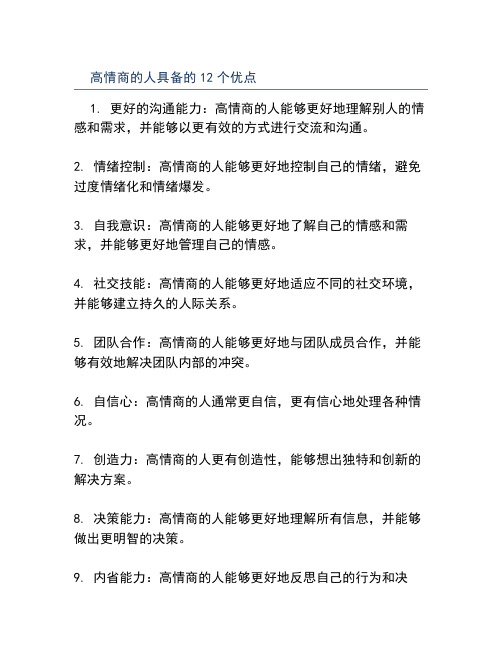
高情商的人具备的12个优点
1.更好的沟通能力:高情商的人能够更好地理解别人的情感和需求,并能够以更有效的方式进行交流和沟通。
2.情绪控制:高情商的人能够更好地控制自己的情绪,避免过度情绪化和情绪爆发。
3.自我意识:高情商的人能够更好地了解自己的情感和需求,并能够更好地管理自己的情感。
4.社交技能:高情商的人能够更好地适应不同的社交环境,并能够建立持久的人际关系。
5.团队合作:高情商的人能够更好地与团队成员合作,并能够有效地解决团队内部的冲突。
6.自信心:高情商的人通常更自信,更有信心地处理各种情况。
7.创造力:高情商的人更有创造性,能够想出独特和创新的解决方案。
8.决策能力:高情商的人能够更好地理解所有信息,并能够做出更明智的决策。
9.内省能力:高情商的人能够更好地反思自己的行为和决
策,并从自己的经验中学习。
10.共情能力:高情商的人能够更好地理解别人的情感和需求,并能够提供支持和帮助。
11.适应性:高情商的人能够更好地适应不同的环境和变化,并能够快速适应新情况。
12.领导力:高情商的人通常是出色的领导者,能够指导和激励团队成员,并实现组织的目标。
18个高情商的人才有的特质你有吗?

高情商的人才有的18个特质,你有吗?1. 拥有丰富的情感词汇不是每个人都有能力准确地表达自己的情绪和情感,有个研究说只有36% 的人能做到。
说清楚自己的感受,是良好沟通的第一步。
2. 对人类好奇不管是外向还是内向,高情商的人都对“人”这种生物感兴趣。
这种好奇是源于同理心,也就是设身处地理解别人的能力。
对于情商高的人来说,在另一个人身上,Ta 可以看到另一个世界。
相信在过几年我会感激现在这段困难的日子,因为艰难才有了改变的动力,因为贫困才有了奋斗的目标。
就像我现在也还在感激2011年一样,那年的我什么都没有,只有锐利的个性,刺伤过别人!错事接二连三,整个半年左右的时间,我将自己置于最艰难的、不利的、悲催的生活里。
也是从那时起,我开始学会努力的、认真的去做好一件事!别把自己的青春葬送在自己的满嘴借口中和奢求安逸舒适的环境中。
就算再努力十年,也只有区区四十岁,不惑之年吧!而这十年,兢兢业业,每天进步一小点,也足够人生有一场质的飞跃。
3. 勇敢接纳改变情商高的人有更好的灵活性和环境适应力,Ta 们乐于接纳改变,并适时调整把改变转化为机会。
4. 了解自己的优缺点企业中层干部所面临的“人”,上司是人,同僚是人,下属也是人,中层干部整天就是跟人打交道;做事是基础,为人是根本,做事的本领再强,但为人失败,是中层干部最大的失败。
潜规则不是公司制度里所能找到的,也绝非大学课堂里讲授的,摸清潜规则,并按潜规则做事、为人,才有可能让上司赏识你,同僚配合你,下属尊重你,你的职场生涯才能顺利发展,否则,即使干劲冲天,也有可能里外不讨好、四面楚歌。
企业的汉堡结构(高层要有决策力,基层要有行动力,中层需要执行力)。
中层的三大难关(上司认可、同僚支持、下属推崇).中层的一大软肋:推卸责任(员工可以跳槽,老板只能跳楼)。
领导都是对的:坚决执行(与领导的意见不一致时,第一服从,第二沟通)。
维护领导威信:自我退后(长用者多批评,短用者多表扬)用数字说话:结果至上(汇报工作谈结果,请示工作说方案).请领导做选择题:勤于思考(问答题永远留给自己)。
高情商的10个特征,有8个以上就很了不起!
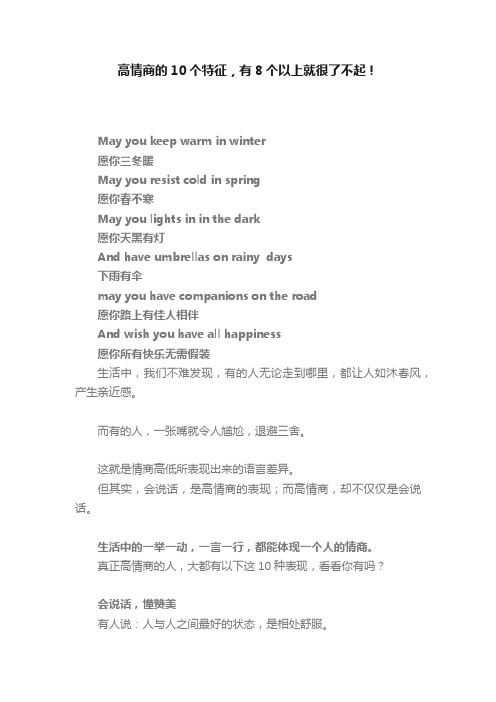
高情商的10个特征,有8个以上就很了不起!May you keep warm in winter愿你三冬暖May you resist cold in spring愿你春不寒May you lights in in the dark愿你天黑有灯And have umbrellas on rainy days下雨有伞may you have companions on the road愿你路上有佳人相伴And wish you have all happiness愿你所有快乐无需假装生活中,我们不难发现,有的人无论走到哪里,都让人如沐春风,产生亲近感。
而有的人,一张嘴就令人尴尬,退避三舍。
这就是情商高低所表现出来的语言差异。
但其实,会说话,是高情商的表现;而高情商,却不仅仅是会说话。
生活中的一举一动,一言一行,都能体现一个人的情商。
真正高情商的人,大都有以下这10种表现,看看你有吗?会说话,懂赞美有人说:人与人之间最好的状态,是相处舒服。
那么,还有什么比赞美更能让人舒服呢?良言一句三冬暖,一句赞美的话,能让人感受到发自心底的温暖。
看过一句话:同是一棵树,有的人看到的是郁郁葱葱,而有的人却只看到树梢上的毛毛虫,原因就在于有的人懂得赏识和赞美。
高情商的人,总是能发现美好的东西,并不吝于赞美。
很多时候,一句称赞,一声鼓励,就能成为别人努力的动力、生活的勇气。
当然,赞美也需有度,更需真诚。
不是阿谀奉承,不是刻意讨好,而是发自内心的欣赏与认同。
会倾听,懂尊重日本企业家松下幸之助被誉为“经营之神”,曾经用一句话总结自己的经营哲学:“要细心倾听他人的意见。
”人有两只耳朵,却只有一个嘴巴,意味着我们应当多听少说。
没人愿意跟一个只想表现自己的人交流,但大多数人都愿意跟善于倾听的人交朋友。
毕竟大部分人,还是希望心里的话,能有处倾诉。
聊天里,多用“你”开头,少说“我”的事。
多聊聊别人感兴趣的话题。
高情商的人,是一个很好的倾听者。
高情商人的十个表现

高情商人的十个表现
1.自信和冷静:高情商人能够保持自信和冷静,即使面对压力和挑战,也能准确地分析现实问题和决策。
2.善于沟通:高情商人具备良好的沟通技巧,能够有效地与他人交流
和建立互信关系,能够顺畅地表达自己的意见和观点。
3.善于倾听:高情商人能够倾听他人的意见和想法,理解他们的感受
和需要,能够为他人提供帮助和支持。
4.有同理心:高情商人能够理解他人的感受和需要,对他人的情感有
高度的敏感性和同情心,能够提供有效的支持和帮助。
5.具有团队合作精神:高情商人能够积极地参与团队合作,善于协调
和处理团队内部的冲突和问题,能够提高团队的效率和凝聚力。
6.具有灵活性和适应性:高情商人能够适应不同情境和人际关系,并
灵活地应对不同的挑战和变化,能够提供更高效的决策和解决方案。
7.稳定情绪和掌控情绪:高情商人能够稳定自己的情绪,掌控自己的
情绪,避免情绪波动带来的消极影响。
8.善于解决问题:高情商人能够分析问题,找到解决问题的方法和策略,能够高效地解决各种复杂问题和困难。
9.具有创造性和创新能力:高情商人具备创新思维和创造力,能够提
出新的想法和方案,并能够将其付诸实践和行动。
10.保持积极心态:高情商人能够保持积极的心态和态度,对生活和
工作充满热情和动力,以积极的精神面对挑战和困难。
〝高情商〞者的9大特征 您有几个
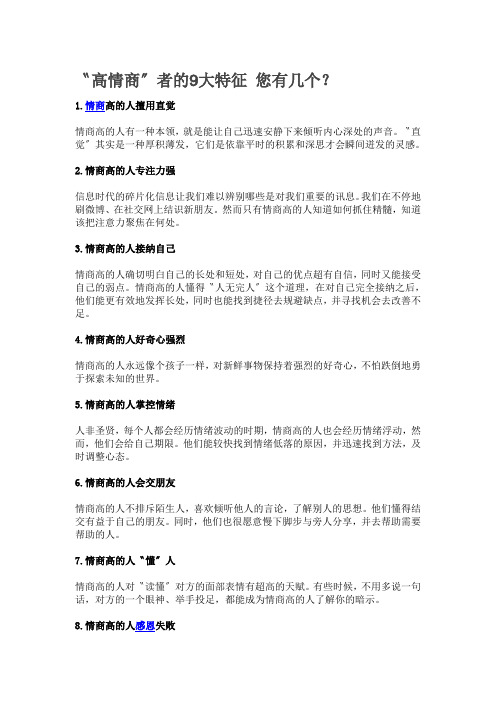
〝高情商〞者的9大特征您有几个?1.情商高的人擅用直觉情商高的人有一种本领,就是能让自己迅速安静下来倾听内心深处的声音。
〝直觉〞其实是一种厚积薄发,它们是依靠平时的积累和深思才会瞬间迸发的灵感。
2.情商高的人专注力强信息时代的碎片化信息让我们难以辨别哪些是对我们重要的讯息。
我们在不停地刷微博、在社交网上结识新朋友。
然而只有情商高的人知道如何抓住精髓,知道该把注意力聚焦在何处。
3.情商高的人接纳自己情商高的人确切明白自己的长处和短处,对自己的优点超有自信,同时又能接受自己的弱点。
情商高的人懂得〝人无完人〞这个道理,在对自己完全接纳之后,他们能更有效地发挥长处,同时也能找到捷径去规避缺点,并寻找机会去改善不足。
4.情商高的人好奇心强烈情商高的人永远像个孩子一样,对新鲜事物保持着强烈的好奇心,不怕跌倒地勇于探索未知的世界。
5.情商高的人掌控情绪人非圣贤,每个人都会经历情绪波动的时期,情商高的人也会经历情绪浮动,然而,他们会给自己期限。
他们能较快找到情绪低落的原因,并迅速找到方法,及时调整心态。
6.情商高的人会交朋友情商高的人不排斥陌生人,喜欢倾听他人的言论,了解别人的思想。
他们懂得结交有益于自己的朋友。
同时,他们也很愿意慢下脚步与旁人分享,并去帮助需要帮助的人。
7.情商高的人〝懂〞人情商高的人对〝读懂〞对方的面部表情有超高的天赋。
有些时候,不用多说一句话,对方的一个眼神、举手投足,都能成为情商高的人了解你的暗示。
8.情商高的人感恩失败不是说情商高的人就不会失败,失败是每个人都会经历的过程。
情商高的人不会在失败之后沉溺很长时间,他们的韧性极强。
对于失败的态度,情商高的人会抱有感恩的心,把失败当老师,从中学到教训,而不是被打击得一蹶不振。
9.情商高的人有领导者的责任心和包容心自古以来,杰出的领袖都具有高情商,他们不仅有天赋、职业素养以及工作上的野心,最重要的是,他们的责任心很强,自律性很高,有勇气去承担重任。
你认为自己情商高吗?来看看这12种高情商的表现吧(英汉对照)
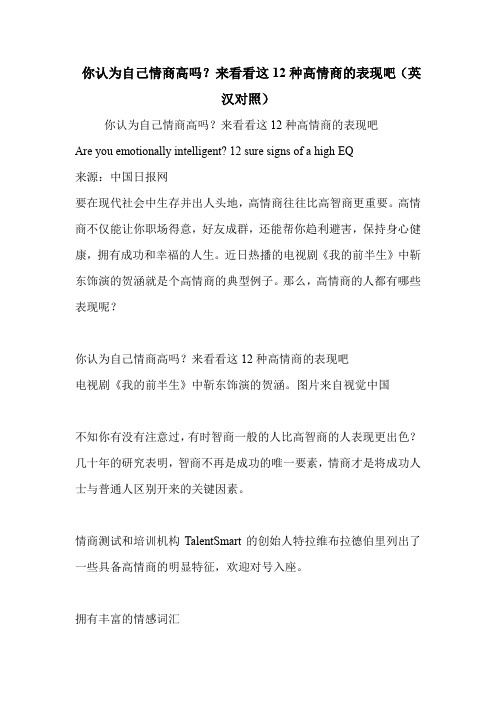
你认为自己情商高吗?来看看这12种高情商的表现吧(英汉对照)你认为自己情商高吗?来看看这12种高情商的表现吧Are you emotionally intelligent? 12 sure signs of a high EQ来源:中国日报网要在现代社会中生存并出人头地,高情商往往比高智商更重要。
高情商不仅能让你职场得意,好友成群,还能帮你趋利避害,保持身心健康,拥有成功和幸福的人生。
近日热播的电视剧《我的前半生》中靳东饰演的贺涵就是个高情商的典型例子。
那么,高情商的人都有哪些表现呢?你认为自己情商高吗?来看看这12种高情商的表现吧电视剧《我的前半生》中靳东饰演的贺涵。
图片来自视觉中国不知你有没有注意过,有时智商一般的人比高智商的人表现更出色?几十年的研究表明,智商不再是成功的唯一要素,情商才是将成功人士与普通人区别开来的关键因素。
情商测试和培训机构TalentSmart的创始人特拉维布拉德伯里列出了一些具备高情商的明显特征,欢迎对号入座。
拥有丰富的情感词汇People with high EQs master their emotions because they understand them, and they use an extensive vocabulary of feelings to do so. While many people might describe themselves as simply feeling bad, emotionally intelligent people can pinpoint whether they feel irritable, frustrated, downtrodden, or anxious.高情商的人之所以可以掌控自身的情绪是因为他们能理解这些情绪,并可以用丰富的情感词汇来描述它们。
当许多人仅仅用简单的词汇例如不好来描述自身的情绪时,高情商的人能够指出他们所感觉到的是急躁,沮丧,压抑还是不安。
高智商人群的八个特质

高智商人群的八个特质1. They're highly adaptable.1. 适应能力强。
Several Quora users noted that intelligent people are flexible and able to thrive in different settings. As Donna F Hammett writes, intelligent people adapt by "showing what can be done regardless of the complications or restrictions placed upon them."有几位Quora用户在回答中提到,高智商的人常常有良好的适应能力,懂得在不同环境下绽放光芒。
正如Donna F Hammett的回答:高智商的人们,不管当前面临的条件多么复杂,有多少限制因素,他们都能够很好地完成任务。
Recent psychological research supports this idea. Intelligence depends on being able to change your own behaviors in order to cope more effectively with your environment, or make changes to the environment you're in.最新的一项心理学调查支持了这一观点。
智商能力,常常表现为:因环境的变化而调整个人的行为从而更有效地适应它,或对当前所处的环境做出一些调整。
2. They understand how much they don't know.2. 了解自己的不足。
The smartest folks are able to admit when they aren't familiar with a particular concept. As Jim Winer writes, intelligent people "are not afraid to say: 'I don't know.' If they don't know it, they can learn it."聪明的人敢于承认自己不熟悉的领域。
高情商的人,都有这6种习惯

高情商的人,都有这6种习惯People with high EQ have these six habits.最高的情商不是心机,而是替别人着想的善意。
The highest EQ is not the mind, but the kindness for the sake of others.有一条广为流传的公式:人的成功=1%的智商+99%的情商。
There is a popular formula: success = 1% IQ of 99% EQ.很多人会发现,有些朋友可能没有高学历,但和他聊天时总是感觉如沐春风,这类人往往在社会上“吃得开、混得好”。
Many people will find that some friends may not have a high degree of education, but they always feel comfortable chatting with them. These people tend to eat well in society.而有些人,一出口就一片冷场,他们在社会中也总是处处碰壁。
And some people, as soon as the exit is a cold field, they also always in the society everywhere hit the wall.究其原因,就是情商的问题。
6个高情商的习惯,一点点的改变着你的人生。
The reason is EQ. 6 high EQ habits change your life a little bit.01 高情商的人,善于倾听。
A man of high emotional intelligence is good at listening.倾听是一种艺术,一种品德,更是一种高情商的表现。
Listening is a kind of art, a kind of character, it is a kind of high-EQ performance.什么叫善于倾听?善于倾听就是专注的等别人把话说完。
中考英语复习:双语版聪明人的十大特征

中考英语复习:双语版聪明人的十大特征中考英语复习:双语版聪明人的十大特征Unless you think you’re the smartest,who doesn’t want to be smarter?Of course I want to be smarter too,so I try to find out who’s the real smart guy that maybe I can learn from.除非你觉得自己聪明绝顶无人能敌,谁不想变得再聪明一点呢?我也是,所以我就想看看能从那些聪明的家伙身上学到点什么。
Here are the signs of smart people:以下是聪明人的10大信号:1. They don’t talk as much as you,because they know they got smart by listening。
他们不会说太多,因为他们知道多听才能变聪明。
2. They know lots of things other than what they’re specialized in. Theirs is the gift of a broad mind,constantly fed with the stimulant of being interested in what everyone else is doing。
除去专业知识之外,他们知道的很多。
他们的天赋就是思维活跃,总是对其他人在做的事情充满好奇和兴趣。
3. They juggle home,work and personal interests with dexterity and never fall back on the tired old refrain about “work life balance”. And when they’re juggling,they somehow manage to seem 100% engaged with what they’re doing,on all fronts simultaneously,even though you know they’re taking appropriate steps behind the scenes to make sure their lives are perfectly,serenely balanced。
高情商的人具备的12个优点

高情商的人具备的12个优点
1. 情绪管理能力强:高情商的人能够有效地管理自己的情绪,不易被外界的情绪波动所影响,能够保持冷静和理智的态度。
2. 自我意识强:他们对自己的情感和行为有很高的认识度,能够清楚地知道自己的优点和缺点,从而更好地发展自己的潜力。
3. 社交能力强:高情商的人擅长与人沟通和合作,能够建立良好的人际关系,处理冲突和解决问题。
4. 具有同理心:他们能够理解和感受他人的情感和需求,能够给予别人关心和支持。
5. 适应能力强:高情商的人能够适应各种不同的环境和情境,能够快速地适应变化并做出相应的调整。
6. 乐观积极:他们通常能够积极地看待问题和困难,具有积极的心态和态度。
7. 创造力强:高情商的人能够灵活地思考和解决问题,能够提出新的创意和想法。
8. 自我激励能力强:他们能够自我激励和推动自己去追求目标,具有坚持不懈的毅力。
9. 客观分析能力强:高情商的人能够客观地分析问题和情况,不受
个人情感和偏见的干扰。
10. 解决问题能力强:他们能够有效地解决问题,找到最佳的解决方案。
11. 接受和适应反馈:高情商的人能够接受他人的反馈和建议,并能够根据反馈来改进自己。
12. 高度的自信:他们对自己有很高的自信,相信自己的能力和价值,能够应对各种挑战和困难。
高情商人士的十大特质(中英双语)

高情商人士的十大特质If you want to know if you have high emotional intelligence, here are a few tips to guide you along the way.如果你想知道自己情商高不高,那么,下文能给你几个提示。
Have you ever wondered why some people seem to have an unlimited amount of success in both their personal and professional lives?你是否曾经疑惑,为什么有些人看上去在个人生活和职业生涯中都有着众多的成功经历?It could be because they possess high emotional intelligence.这可能是因为他们有着很高的情商。
According to Psychology Today, "Emotional intelligence is the ability to identify and manage your own emotions and the emotions of others."据《现代心理学》称,“情商是一种能够辨识和掌控个人自己和他人情感的能力。
”This usually involves:这通常涉及到:·emotional awareness, which includes the ability to identify your own emotions as well as those of others;情感意识,即能够辨识自己和他人的情感;·the ability to harness emotions and apply them to tasks such as problem solving;能够利用情绪,将之用于诸如解决问题这样的目标;·the ability to manage your emotions, such as being able to calm down when you're upset.能够管理好自己的情绪,例如在失落的时候能让自己冷静下来。
情商高的十个习惯
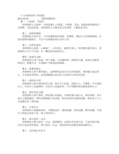
一个人情商高的十种表现2013-09-02 _ 思维导图培训第一:不抱怨、不批评高情商的人不批评、不指责别人;不抱怨、不埋怨。
其实,抱怨和职责都是不良情绪,它们会传染。
高情商的人只做有意义的事情,不做没意义的。
第二:热情和激情高情商的人对生活、工作和感情保持热情,有激情。
调动自己的积极情绪,让好的情绪伴随每天。
不让不良情绪影响生活和工作。
第三:包容和宽容高情商的人宽容,心胸宽广,心有多大,眼界有多大,你的舞台就有多大。
高情商的人不斤斤计较,有一颗包容和宽容的心。
第四:沟通与交流高情商的人善于沟通,善于交流,且坦诚相待,真诚有礼貌。
沟通与交流是一种技巧,需要学习,在实践中不断地总结摸索。
第五:多赞美别人高情商的人善于赞美别人,这种赞美是发自内心的真诚的。
看到别人优点的人,才会进步得更快,总是挑拣别人缺点的人会固步自封反而退步。
第六:保持好心情高情商的人每天保持好的心情,每天早上起来,送给自己一个微笑,并且鼓励自己,告诉自己是最棒的,告诉自己是最好的,并且周围的朋友都很喜欢自己。
第七:聆听的好习惯高情商的人善于聆听,聆听别人的说话,仔细听别人说什么,多听多看,而不是自己滔滔悬河。
聆听是尊重他人的表现,聆听是更好沟通的前提,聆听是人与人之间最好的一种沟通。
第八:有责任心高情商的人敢做敢承担,不推卸责任,遇到问题,分析问题,解决问题。
正视自己的优点或是不足,敢于承担的人。
第九:每天进步一点点高情商的人每天进步一点点,说到做到,从现在其开始行动。
不是光说不做,行动力是成功的保证。
每天进步一点点,朋友们也更加愿意帮助这样的人。
第十:记住别人的名字高情商的人善于记住别人的名字,用心去做,就能记住。
记住了别人的名字,别人也会更加愿意亲近你,和你做朋友,你会有越来越多的朋友,有好的朋友圈子。
高情商者的15个表现

高情商者的15个表现1、你喜欢钻研他人行事的动机。
情商高的人对人类行为非常着迷。
他们会注意到其他人的肢体语言、方言甚至是脸部微妙的抽搐。
因为他们喜欢观察别人,所以也就能明白每个人的独特之处。
2、你是热情的领导者,言出必行。
情商高的人都知道要言出必行。
作为领导者,他们不是站在背后发号施令,而是走在前面做出表率。
3、你清楚自己的优势和短板。
情商高的人知道,最大的缺陷不能说明你弱势的一面,而最大的优势则可以显示出你强势的一面。
他们会充分发挥自己最大的优势,来弥补自身不足。
4、你能够平静地面对过去。
情商高的人根本没有时间去后悔。
他们放下过去,着眼当前。
因为他们知道,只有这样才能进步。
5、你对未来充满信心。
情商高的人并不会因为未来难以预料而心神不宁。
他们的生活很快乐,不需要水晶球预测未来。
因为对他们来说,生命应当是一次刺激的冒险之旅,而非预先安排的常规生活。
6、你能够活在当下,体会当前的每一刻。
情商高的人不会简单地“度过”每一天。
相反,他们会积极体验每一天每一刻的细腻与微妙。
7、你是一个成熟主动的聆听者。
情商高的人知道,“听到”和“聆听”是两个截然不同的概念。
他们会用提问题的形式重复别人说过的话,确保自己没有遗漏任何信息。
8、你知道自己为什么不高兴。
情商高的人不会让自己的消极情绪影响自己。
他们会主动寻找自己不开心的原因,最重要的是,他们会想办法让自己开心起来。
9、你能自如地和朋友以及陌生人交谈。
情商高的人从不会不喜欢陌生人。
他们不在乎陌生人的年龄、种族、宗教、性别、性取向或者政治立场。
因为他们知道,我们都是一样的人,所以对待每个人都一样。
10、你在生活和工作上都严守道德标准。
无论是在工作还是生活上,情商高的人都会遵循道德标准和原则。
他们每一个人的价值观可能会有所不同,但是都会用高标准来要求自己。
11、你非常热心助人。
情商高的人认为助人不需要理由。
他们会帮老太太拎食品袋,会在晚餐后帮朋友或另一半洗碗;如果他先进门,无论后面是女士还是男士,他都会为他们把住门。
高情商的十大特征表现
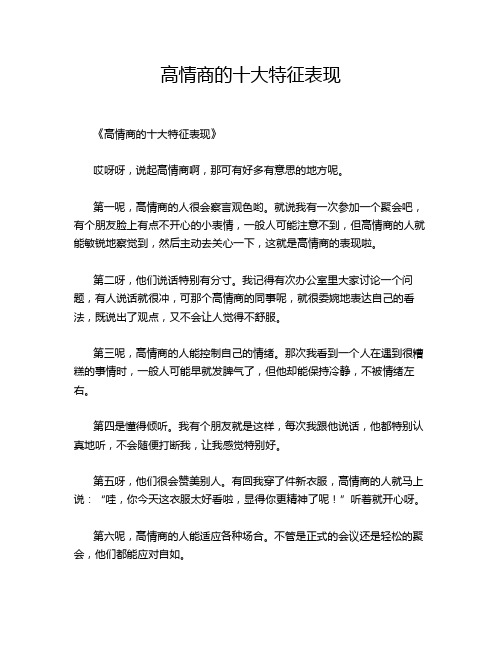
高情商的十大特征表现《高情商的十大特征表现》哎呀呀,说起高情商啊,那可有好多有意思的地方呢。
第一呢,高情商的人很会察言观色哟。
就说我有一次参加一个聚会吧,有个朋友脸上有点不开心的小表情,一般人可能注意不到,但高情商的人就能敏锐地察觉到,然后主动去关心一下,这就是高情商的表现啦。
第二呀,他们说话特别有分寸。
我记得有次办公室里大家讨论一个问题,有人说话就很冲,可那个高情商的同事呢,就很委婉地表达自己的看法,既说出了观点,又不会让人觉得不舒服。
第三呢,高情商的人能控制自己的情绪。
那次我看到一个人在遇到很糟糕的事情时,一般人可能早就发脾气了,但他却能保持冷静,不被情绪左右。
第四是懂得倾听。
我有个朋友就是这样,每次我跟他说话,他都特别认真地听,不会随便打断我,让我感觉特别好。
第五呀,他们很会赞美别人。
有回我穿了件新衣服,高情商的人就马上说:“哇,你今天这衣服太好看啦,显得你更精神了呢!”听着就开心呀。
第六呢,高情商的人能适应各种场合。
不管是正式的会议还是轻松的聚会,他们都能应对自如。
第七,他们会给人台阶下。
有次有人犯了个小错,场面有点尴尬,高情商的人马上就说了句巧妙的话,化解了尴尬。
第八,高情商的人很有幽默感。
在一起的时候总是能把大家逗乐,让气氛特别轻松愉快。
第九,他们会照顾别人的感受。
比如一起出去吃饭,会考虑到每个人的口味和喜好。
第十,高情商的人很有耐心。
哪怕别人问很幼稚的问题,他们也会耐心解答。
总之啊,高情商的人就是让人相处起来特别舒服,特别愉快呀,大家都要努力向高情商看齐哟!哈哈!。
聪明人的特性(双语)英语提高

聪明人的特性作者: 选自<<心情驿站>>译者: 爱尔兰UCD 赖小琪1.他们知道自己的价值。
聪明人的技能多半属于隐性技能,而不是那种可用文字记录下来并广泛交流的标准化技能。
目前没有一个知识管理系统能够捕捉到隐性知识,这意味着你非得雇用他们才能得到他们的知识和技能,你不可能把他们身上的知识转给他人。
1. They know their own value. Smart peo ple’s capabilities are most likely to be invisible that cannot be documented by words and widely spread. Currently there is not a single knowledge management system that can garner invisible knowledge, which indicates that you have to employ these smart people in order to utilize their knowledge and skills. It is impossible for you to transfer theirknowledge to others.2.他们对组织嗅觉敏锐。
聪明人在公司政治上并不幼稚、清高,他们善于寻找对自己最有利的工作环境,从而使自己的兴趣得到最充分的资金支持。
一旦资金枯竭,他们还有两个选择:转移到下一个资源充足的地方,或者就地深挖,卷入复杂的政治斗争来推进自己喜欢的项目。
2. They have an acute sense of organization. Smart people are by no means innocent or arrogant in corporate politics. Instead, they are good at seeking the most favorable work environment and feed their interests with sufficient capitals. Once the capital runs out, they will face two choices: either shift to another capital-rich environment or getting involved in the complicated political combat to promote their favored projects.3.他们无视企业的层级制度。
高情商处事18个谋略
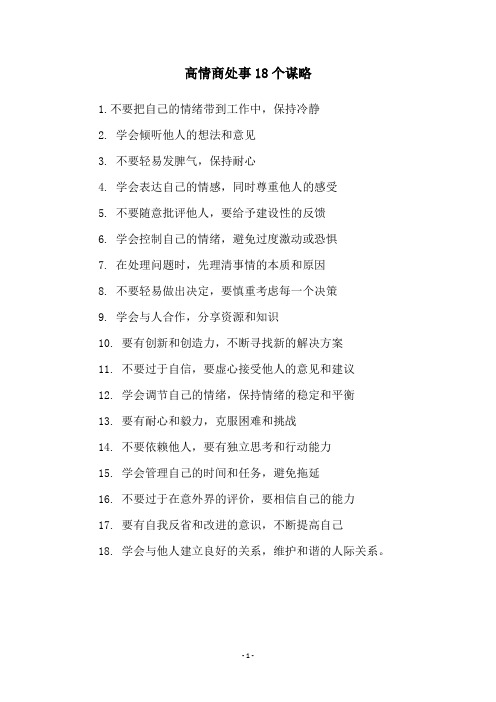
高情商处事18个谋略
1.不要把自己的情绪带到工作中,保持冷静
2. 学会倾听他人的想法和意见
3. 不要轻易发脾气,保持耐心
4. 学会表达自己的情感,同时尊重他人的感受
5. 不要随意批评他人,要给予建设性的反馈
6. 学会控制自己的情绪,避免过度激动或恐惧
7. 在处理问题时,先理清事情的本质和原因
8. 不要轻易做出决定,要慎重考虑每一个决策
9. 学会与人合作,分享资源和知识
10. 要有创新和创造力,不断寻找新的解决方案
11. 不要过于自信,要虚心接受他人的意见和建议
12. 学会调节自己的情绪,保持情绪的稳定和平衡
13. 要有耐心和毅力,克服困难和挑战
14. 不要依赖他人,要有独立思考和行动能力
15. 学会管理自己的时间和任务,避免拖延
16. 不要过于在意外界的评价,要相信自己的能力
17. 要有自我反省和改进的意识,不断提高自己
18. 学会与他人建立良好的关系,维护和谐的人际关系。
- 1 -。
高情商的人具备的12个优点
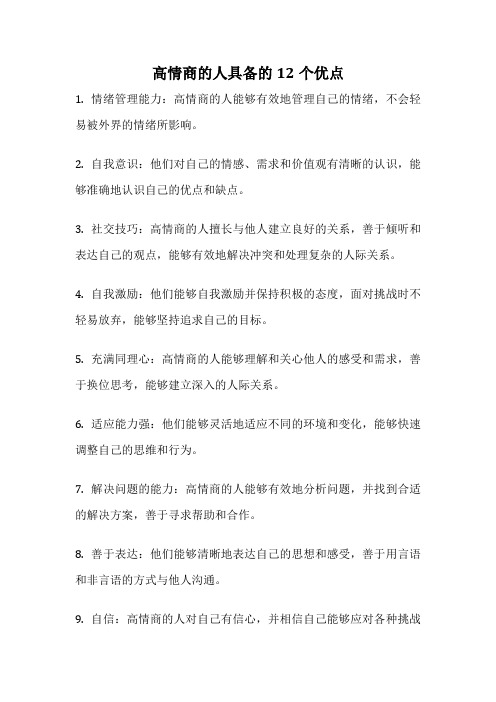
高情商的人具备的12个优点
1. 情绪管理能力:高情商的人能够有效地管理自己的情绪,不会轻易被外界的情绪所影响。
2. 自我意识:他们对自己的情感、需求和价值观有清晰的认识,能够准确地认识自己的优点和缺点。
3. 社交技巧:高情商的人擅长与他人建立良好的关系,善于倾听和表达自己的观点,能够有效地解决冲突和处理复杂的人际关系。
4. 自我激励:他们能够自我激励并保持积极的态度,面对挑战时不轻易放弃,能够坚持追求自己的目标。
5. 充满同理心:高情商的人能够理解和关心他人的感受和需求,善于换位思考,能够建立深入的人际关系。
6. 适应能力强:他们能够灵活地适应不同的环境和变化,能够快速调整自己的思维和行为。
7. 解决问题的能力:高情商的人能够有效地分析问题,并找到合适的解决方案,善于寻求帮助和合作。
8. 善于表达:他们能够清晰地表达自己的思想和感受,善于用言语和非言语的方式与他人沟通。
9. 自信:高情商的人对自己有信心,并相信自己能够应对各种挑战
和困难。
10. 接纳变化:他们能够接受和适应变化,并从中寻找机会和成长。
11. 自我调节:高情商的人能够自我调节,不会轻易陷入情绪的极端,能够保持内心的平静和冷静。
12. 乐观积极:他们倾向于保持积极的态度,能够看到问题的解决方案而不是困难的阻碍。
情商高的人的十种特质
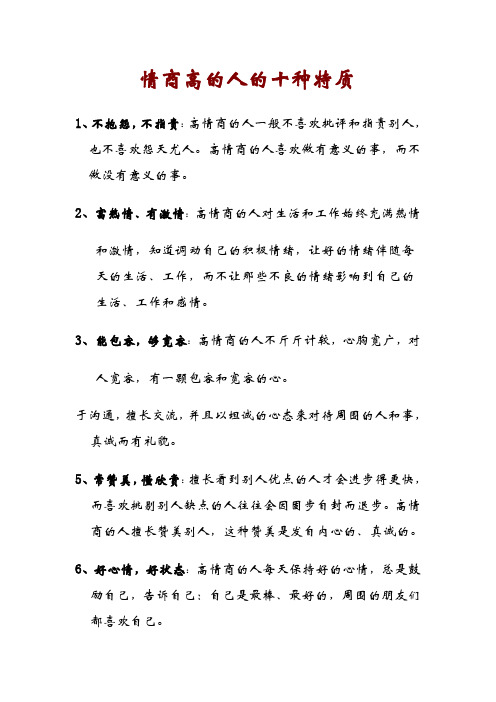
情商高的人的十种特质
1、不抱怨,不指责:高情商的人一般不喜欢批评和指责别人,也不喜欢怨天尤人。
高情商的人喜欢做有意义的事,而不做没有意义的事。
2、富热情、有激情:高情商的人对生活和工作始终充满热情
和激情,知道调动自己的积极情绪,让好的情绪伴随每天的生活、工作,而不让那些不良的情绪影响到自己的生活、工作和感情。
3、能包容,够宽容:高情商的人不斤斤计较,心胸宽广,对
人宽容,有一颗包容和宽容的心。
于沟通,擅长交流,并且以坦诚的心态来对待周围的人和事,真诚而有礼貌。
5、常赞美,懂欣赏:擅长看到别人优点的人才会进步得更快,
而喜欢挑剔别人缺点的人往往会因固步自封而退步。
高情商的人擅长赞美别人,这种赞美是发自内心的、真诚的。
6、好心情,好状态:高情商的人每天保持好的心情,总是鼓
励自己,告诉自己:自己是最棒、最好的,周围的朋友们都喜欢自己。
7、喜聆听,勤观察:聆听,是尊重别人的表现;观察,是更
好沟通的前提。
高情商的人擅长聆听别人的说话和观察别人的行动,而不是自己口若悬河。
8、有责任,敢担当:高情商的人敢作敢当,不推卸责任;遇
到问题,分析问题,解决问题;是敢于正视自己的优点和缺点,敢于担当的人。
9、重行动,渐进步:行动力是成功的保证!高情商的人从当
下做起,说到做到,每天进步一点点,朋友们也更加愿意协助这样的人。
10、用心做,认真记:用心去做,就能做到!高情商的人擅
长记住别人的名字,而记住了别人的名字,别人也会更加愿意亲近你,和你做朋友,于是你会有越来越多的朋友,有好的朋友圈子。
高情商人士的特质

高情商人士的特质作者:John Rampton来源:《新高考·英语进阶(高二高三)》2016年第08期据《现代心理学》称,“情商是一种能够辨识和掌控自己和他人情感的能力。
”如果你想知道自己是否具備高情商,或者想要提高自己的情商以期获得生活和工作中的成功,那么,以下七个高情商人士都具备的特质就是你需要考虑的。
1.他们都不是完美主义者。
完美主义在你完成任务和实现目标的时候可能会造成阻碍,因为它会导致你很难开始工作、拖延,以及在没有正确答案时非要去找出一个来。
这就是为什么高情商人士都不是完美主义者。
他们意识到,完美并不存在,于是会加紧推进自己的工作进度。
如果他们犯了错,他们会进行调整,并从中吸取教训。
这一点是我个人每天都要练习的,因为我有点偏向完美主义。
2.他们乐于接受变化。
高情商人士们并不惧怕变化,他们意识到变化是生活的一部分。
惧怕改变会阻碍成功,所以他们适应身边的变化,在任何可能出现变化的地方,他们都会有相应的应对计划。
3.他们很会站在他人立场上考虑。
丹尼尔·戈尔曼是一名心理学家和《专注:卓越的潜在推动力》一书的作者,他告诉《赫芬顿邮报》,同理心是情商的五大要素之一。
事实上,能够站在别人的立场上考虑问题、同情心和花时间去帮助别人是情商中最最重要的元素。
除此之外,同理心会让情商高的人对他人产生好奇心,让他们在与他人初次见面时提出很多问题。
4.他们知道自己的优势和弱点。
高情商人士知道自己擅长什么、不擅长什么。
他们接受自己的优缺点;还会在恰当的情况下与合适的人合作,以平衡地利用自己的优缺点。
5.他们有很强的自我驱动力。
你是不是那种充满野心、工作勤奋的小孩?被激励着要达成一个目标,而不仅仅是因为这最终能给你带来奖赏?成为一个真正能干的人,甚至是在很年轻的时期,这是高情商人士的另一个特质。
6.他们不纠结于过去。
高情商人士没有时间去纠结于过去,因为他们忙于关注明天会出现的各种可能性。
他们不会让过去的失误给自己带来消极的影响,也不会积累仇恨。
- 1、下载文档前请自行甄别文档内容的完整性,平台不提供额外的编辑、内容补充、找答案等附加服务。
- 2、"仅部分预览"的文档,不可在线预览部分如存在完整性等问题,可反馈申请退款(可完整预览的文档不适用该条件!)。
- 3、如文档侵犯您的权益,请联系客服反馈,我们会尽快为您处理(人工客服工作时间:9:00-18:30)。
When emotional intelligence (EQ) first appeared to the masses, it served as the missing link in a peculiar finding: people with average IQs outperform those with the highest IQs 70% of the time. This anomaly threw a massive wrench into the broadlyheld assumption that IQ was the sole source of success.当情商(EQ)初次出现在人们的话题时,通常是那些奇怪发现中所缺失的一环:拥有平均水平智商的人们通常都比高智商人士的表现更出色,比例达到70%。
这种“不正常”的现象使得大量认为“智商是成功的唯一要素”的假设发生了改变。
Decades of research now point to emotional intelligence as being the critical factor that sets star performers apart from the rest of the pack. The connection is so strong that 90% of top performers have high emotional intelligence.近几十年来的研究开始把重点转向情绪智商(情商),认为这才是决定成功人士与其他人不同的关键因素。
成功与情商的联系非常密切,几乎90%的成功人士都拥有超高的情商水平。
Emotional intelligence is the “something” in each of us that is a bit intangible. It affects how we manage behavior, navigate social complexities, and make personal decisions to achieve positive results.情商是我们每个人内在的某种无形的“东西”。
它影响着我们如何控制自己的行为,处理社交关系,以及为达到正面效果而做出的个人抉择。
Despite the significance of EQ, its intangible nature makes it very difficult to know how much you have and what you can do to improve if you’re lacking. You can always take a scientifically validated test, such as the one that comes with the Emotional Intelligence 2.0 book.除了情商的重要性之外,它的无形的本质让你无法判断你的水平如何,以及你如何通过努力去弥补你所缺失的。
你的确可以进行科学有效的情商测试,比如从Emotional Intelligence 2.0的书中可以得到结果。
Unfortunately, quality (scientifically valid) EQ tests aren’t free. So, I’ve analyzed the data from the million-plus people TalentSmart has tested in order to identify the behaviors that are the hallmarks of a high EQ. What follows are sure signs that you have a high EQ.但不幸的是,情商的质量(科学上有效)的测试都不是免费的。
所以,笔者从数百万的测试者中分析了一些数据,用以区分哪些行为属于高情商。
下面的这些迹象,如果你都拥有了,那么就证明你拥有了很高的情商。
1.You Have a Robust Emotional Vocabulary1. 拥有丰富的情感词汇。
All people experience emotions, but it is a select few who can accurately identify them as they occur. Our research shows that only 36% of people can do this, which is problematic because unlabeled emotions often go misunderstood, which leads to irrational choices and counterproductive actions.每个人都会有情感,但仅仅有很少一部分人能够准确地描述出来。
笔者的研究发现,只有36%的测试者能够区分出来,这显示了一个问题:一些不显著的情感通常都被误解了,这样就会导致非理性的选择和做出反效果的行为。
People with high EQs master their emotions because they understand them, and they use an extensive vocabulary of feelings to do so. While many people might describe themselves as simply feeling “bad,” emotionally intelligent people can pinpoint whether they feel “irritable,” “frustrated,” “downtrodden,” or “anxious.” The more specific your word choice, the better insight you have into exactly how you are feeling, what caused it, and what you should do about it.拥有高情商的人通常都能控制自己的情绪,因为他们理解这些情绪,并使用大量的情感词汇来描述它们。
当一般人把感觉简单地描述为“感觉不好”,情商高的人能够指出自己所感觉的是“烦躁的”,“沮丧的”,“压抑的”或“不安的”。
你所使用的词汇越精细,你就能更深入地了解自己的情绪,产生这种情绪的原因,以及如何去处理这种情绪。
2.You’re Curious about People2. 对人很感兴趣。
It doesn’t matter if they’re introverted or extroverted, e motionally intelligent people are curious about everyone around them. This curiosity is the product of empathy, one of the most significant gateways to a high EQ. The more you care about other people and what they’re going through, the more curiosity you’r e going to have about them.无论你是外向者还是内向者,情商高的人都对身边的人很好奇。
这种好奇心源自于同理心,一种达到高情商水平的重要表现。
你越关心身边的人以及他们的状况,你对他们的好奇心就越强。
3.You Embrace Change3. 接受改变。
Emotionally intelligent people are flexible and are constantly adapting. They know that fear of change is paralyzing and a major threat to their success and happiness. They look for change that is lurking just around the corner, and they form a plan of action should these changes occur.情商高的人们通常都很灵活并能随机应变。
他们很清楚知道,害怕改变只会麻痹和威胁自己的成功和快乐。
他们寻找潜伏在周围的改变迹象,并能制定计划以应对情况的改变。
4.You Know Your Strengths and Weaknesses4. 了解自己的优缺点。
Emotionally intelligent people don’t just understand emotions; they know what they’re good at and what they’re terrible at. They also know who pushes their buttons and the environments (both situations and people) that enable them to succeed. Having a high EQ means you know your strengths and you know how to lean into them and use them to your full advantage while keeping your weaknesses from holding you back.高情商的人不只是情感细腻,还清楚了解自己所擅长的和不擅长的。
他们也知道哪些人驱使他们以及周遭环境(地利,人和)让他们获得成功。
拥有高情商意味着你了解自己的长处以及你知道如何充分利用它们,从而扬长避短。
5.You’re a Good Judge of Character5. 善于识别性格特点。
Much of emotional intelligence comes down to social awareness; the ability to read other people, know what they’re about, and understand what they're going through. Over time, this skill makes you an exceptional judge of character. People are nomystery to you. You know what they’re all about and understand their motivations, even those that lie hidden beneath the surface.大多数的情商因素都与社会意识有关,也就是能够读懂他人的心,了解他们的情况,揣摩他们的心理状况。
